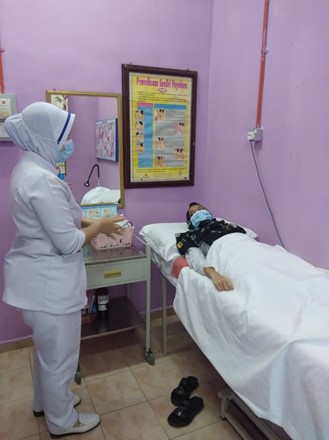Providing safe maternal services during COVID-19, Malaysia

Since March 2020, the District of Yan in Malaysia has been affected by the COVID-19 pandemic. With a population of 78,800, Yan has four health clinics and 13 rural health clinics. Planning has been put in place to provide knowledge to the 100 nurses in the district.
All nurses have been asked to download the Ministry of Health’s “My Sejahtera” application which monitors the movement of nurses and detects close contact to anyone infected by the virus. All nurses record their temperature when entering duty and returning from work.
The Maternal and Child Health Department in Yan District provides pregnancy, child, women’s health and outpatient services as well as post-natal maternal care. According to the New Norm Guidelines, services are provided based on “staggered hours” appointments – two people per hour for normal cases and only one person per hour for problem cases. Each appointment is planned according to the patient’s needs and the number of staff interacting with the patient is limited. The time with the patient is also limited to 15 minutes. In order to reduce congestion, patients’ companions are not allowed to enter the clinic. Nurses and midwives only see one patient in one room and there is a limit of 5-7 people in the waiting room. Congestion is also minimised by a queue number system and spacing of chairs.
Patients are further protected with separate entry and exit routes for patients attending the clinic. All clinics practice screening at the entrance using checklists for body temperature examination and signs of infection such as fever, cold, sore throat, etc. Patients are also asked if they are from an area with a risky COVID-19 cluster. All clinics display posters and streamers as notification of the implementation of the New Norm Movement Control Order.
Handling cases online through counselling services is a challenge for nurses and midwives working with patients in rural areas with bad internet connection service. An even greater challenge for nurses and midwives is when patients are facing financial problems, where the head of the family loses their source of income. A new initiative provides light assistance to reduce the burden on the family, by providing “maternity kits” to mothers who gave birth during the implementation of the last lockdown or CMCO (Conditional Movement Control Order).
To protect staff, all nurses and midwives adhere to the practice of using complete Personnel Protective Equipment (PPE) and to social distancing from colleagues, such as avoiding close contact and always wearing a face mask. In the prayer room, each person is asked to bring their own prayer wear and prayer mat to prevent infection. A sanitization process is performed twice a day in the morning and evening. Every week, the Liaison Officer conducts an internal audit in each unit to ensure staff comply to the Guidelines. The State Health Department has also conducted an audit to confirm compliance with the New Norms Guidelines. Nurses and midwives are also taking care of their mental health and stress levels through deep breathing, massage, music, prayer, and relaxation, therapy, as well as light exercise and Psycho First Action (PFA).
Staff at the Maternal and Child Health Department have found the Guidelines and protocols to be most useful during this time to ensure the safety of staff and patients. While the government and public has been appreciative of nursing work during the pandemic, once it is over, nurses and midwives hope to see an increase in salaries and special allowances and leave for nurses, midwives and their families.

